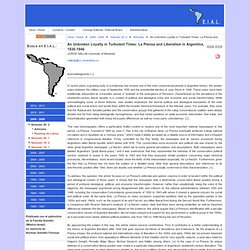

Argentina: Crisis and Democratic Consolidation. Find using OpenURL Buy This Issue Argentina: Crisis and Democratic Consolidation Abstract Argentina made headlines around the world last December as its presidency changed hands no fewer than four times in less than two weeks.Lost amid the chaos,however,were hopeful signs that the country has now turned the corner of democratic consolidation.
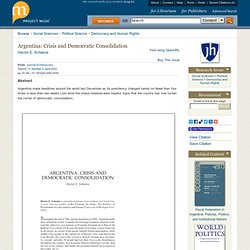
Incorrect username or password. Please select your institution to authenticate with Shibboleth. Scholar.harvard.edu/files/levitsky/files/SL_normalization.pdf. Www.du.edu/korbel/hrhw/researchdigest/latinamerica/argentina.pdf. - The Future of Democracy and Emergin Markets in Latin America Task Force.pdf. Bureaucratic Authoritarianism. Preferred Citation: O'Donnell, Guillermo.
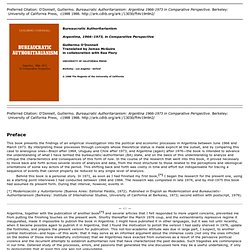
Bureaucratic Authoritarianism: Argentina 1966-1973 in Comparative Perspective. Berkeley: University of California Press, c1988 1988. Preface This book presents the findings of an empirical investigation into the political and economic processes in Argentina between June 1966 and March 1973. By interpreting these processes through concepts whose theoretical status is made explicit at the outset, and by comparing this case to analogous ones—Brazil after 1964, Uruguay and Chile after 1973, and Argentina (again) after 1976—the book is intended to advance the understanding of what I have termed the bureaucratic-authoritarian (BA) state, and on the basis of this understanding to analyze and critique the characteristics and consequences of this form of rule.
Behind this book is a personal story. [*] Modernización y Autoritarismo (Buenos Aires: Editorial Paidós, 1972). Journal of Interamerican Studies and World Affairs, Vol. 26, No. 3 (Aug., 1984), pp. 415-431. Timeline: Argentina. A chronology of key events: 1916 - Hipolito Yrigoyen of the Radical party is elected president.
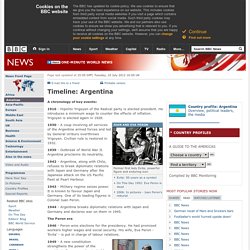
He introduces a minimum wage to counter the effects of inflation. Yrigoyen is elected again in 1928. 1930 - A coup involving all services of the Argentine armed forces and led by General Uriburu overthrows Yrigoyen. Civilian rule is restored in 1932. 1939 - Outbreak of World War II. 1942 - Argentina, along with Chile, refuses to break diplomatic relations with Japan and Germany after the Japanese attack on the US Pacific fleet at Pearl Harbour. 1943 - Military regime seizes power. 1944 - Argentina breaks diplomatic relations with Japan and Germany and declares war on them in 1945.
Scholar.harvard.edu/files/levitsky/files/SL_normalization.pdf. Argentina: Crisis and Democratic Consolidation. Argentine Revolution. Revolución Argentina (Argentine Revolution) was the name given by its leaders to a military coup which overthrew the government of Argentina in June 1966, and to a period of military dictatorship by a military junta from then until 1973.
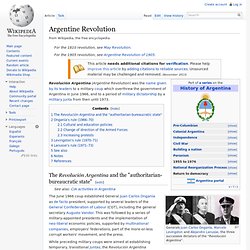
The Revolución Argentina and the "authoritarian-bureaucratic state"[edit] Onganía's rule (1966–70)[edit] Cultural and education policies[edit] Onganía's rule signified an end to university autonomy, which had been achieved by the University Reform of 1918.[2] He was responsible for the July 1966 La Noche de los Bastones Largos ("The Night of the Long Truncheons"), where university autonomy was violated, in which he ordered police to invade the Faculty of Sciences of the University of Buenos Aires.
Onganía also ordered repression on all forms of "immoralism", proscribing miniskirts, long hair for young men, and all avant-garde artistic movements.[2] This moral campaign alienated the middle classes, who were massively present in universities.[2] See also[edit] History of Argentina. Peronism. Peronism (Spanish: Peronismo), or Justicialism (Justicialismo), is an Argentine political movement based on the legacy of former President Juan Domingo Perón and his second wife, Eva Perón.
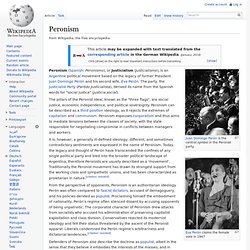
The party, the Justicialist Party (Partido Justicialista), derived its name from the Spanish words for "social justice" (justicia social). The pillars of the Peronist ideal, known as the "three flags", are social justice, economic independence, and political sovereignty. Peronism can be described as a third position ideology, as it rejects the extremes of capitalism and communism. Peronism espouses corporatism and thus aims to mediate tensions between the classes of society, with the state responsible for negotiating compromise in conflicts between managers and workers. It is, however, a generally ill-defined ideology; different, and sometimes contradictory sentiments are expressed in the name of Peronism.
From the perspective of opponents, Peronism is an authoritarian ideology. Perón's policies[edit] Key titles in Latin American Newspapers, Series 2, 1822-1922. Key titles in Latin American Newspapers, Series 2, 1822-1922 A World Newspaper Archive Collection Created in partnership with the Center for Research Libraries, Latin American Newspapers, Series 2, represents a major supplement to the inaugural collection of newspapers from this region.
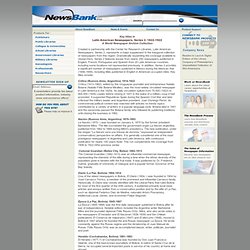
Dramatically expanding the coverage available to researchers, Series 2 features issues from nearly 250 newspapers published in English, French, Portuguese and Spanish from 20 Latin American countries, including some locations not represented previously. In addition, Series 2 provides a significant number of newspapers published in Mexico during the Mexican War (1846-1848), including titles published in English in American-occupied cities.
Key titles include: Estudios Interdisciplinarios de América Latina y el Caribe - An Unbroken Loyalty in Turbulent Times: La Prensa and Liberalism in Argentina, 1930-1946. Nallimja@cc.umanitoba.caEsta dirección de correo electrónico está protegida contra los robots de spam, necesitas tener Javascript activado para poder verla In recent years, a growing body of scholarship has revised one of the most controversial periods in Argentine history: the sixteen years between the military coup of September 1930 and the presidential election of Juan Perón in 1946.
